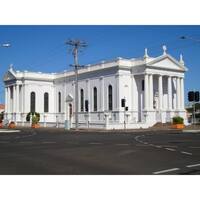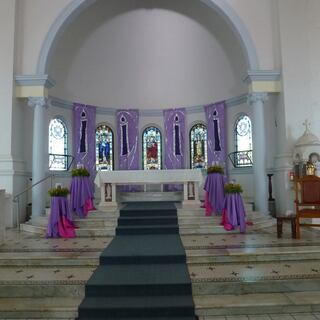- Roman Catholic churches in Bundaberg, QLD
- Roman Catholic churches in Queensland
- Roman Catholic churches in Australia
- Roman Catholic churches near me
- All churches in Bundaberg, QLD
Who we are
Holy Rosary Bundaberg is a Roman Catholic church in Bundaberg, Queensland.
We are a fellowship of believers, made in God's image and called as disciples of Christ to share the Good News with everyone through learning, listening, praying and working together actively to reach out to our communities.
We are a place to believe, belong, and become!
We are a fellowship of believers, made in God's image and called as disciples of Christ to share the Good News with everyone through learning, listening, praying and working together actively to reach out to our communities.
We are a place to believe, belong, and become!
Location of worship

22 Barolin Street
Bundaberg,
QLD
4670
Australia
Phone: 07 4151 6666
Fax: 07 4153 3102
Click here to contact the church
Church Pastor

Rev Peter Tonti PP
Parish Priest
22 Barolin Street
Bundaberg,
QLD
4670
Australia
Phone: 07 4151 6666
Fax: 07 4153 3102
Click here to contact Rev Peter Tonti PP
Music of the Day
My faith has found a resting place
My faith has found a resting place,
Not in device or creed;
I trust the ever living One,
His wounds for me shall plead. ...
Download MP3: My faith has found a resting place mp3
Download lyrics: My faith has found a resting place lyrics
Download lyrics: My faith has found a resting place lyrics
Denomination
Roman Catholic
Affiliations
Church Website
Holy Rosary Bundaberg on Social Media
Holy Rosary Bundaberg YouTube Video
Facebook Video: Holy Rosary Bundaberg Facebook Video
Leadership
Leader Name:
Rev Peter Tonti PP
Leader Position:
Parish Priest
Formal Title:
Leader Address:
Phone:
Fax:
07 4153 3102
Leader Email:
Click here to contact Rev Peter Tonti PP
Leader Bio:
Rev Peter Tonti PP on Social Media:
Other Church Leaders:
Leadership Photos
Add a Photo
Administration
Admin Name:
Mr Jeffrey Caluag
Admin Position:
Administration
Admin Address:
Phone:
Fax:
07 4153 3102
Admin Email:
Click here to contact Mr Jeffrey Caluag
Mailing Address
PO Box 79
Bundaberg, QLD
4670
Bundaberg, QLD
4670
Driving Directions to Holy Rosary Bundaberg
Travel/Direction Tips
Corner Barolin & Woongarra Sts
Parking
Please share parking information and/or parking experience!
Holy Rosary Bundaberg Mass Times
Tuesday
10.00 am – Christian Meditation, Parish Office
12.15 pm – Mass
7.00 pm – United Heart’s Catholic Charismatic Prayer Group (1st & 3rd Tuesday), Novakoski Centre
Friday
11.30 am -Christian Meditation, Parish Office (excluding school holidays)
12.15 pm – Mass
5.30pm – Malayalam Mass (4th Friday of the Month).
Saturday 9.00 – 10.00 am – Reconciliation (or by appointment)
Sunday
8:00 am – Mass
5.30 pm – Mass
It's been more than 2 years since the last mass times update. Please make sure to contact the church to confirm mass times.
Please contact the church to confirm Mass Times or SUBSCRIBE to updates below
10.00 am – Christian Meditation, Parish Office
12.15 pm – Mass
7.00 pm – United Heart’s Catholic Charismatic Prayer Group (1st & 3rd Tuesday), Novakoski Centre
Friday
11.30 am -Christian Meditation, Parish Office (excluding school holidays)
12.15 pm – Mass
5.30pm – Malayalam Mass (4th Friday of the Month).
Saturday 9.00 – 10.00 am – Reconciliation (or by appointment)
Sunday
8:00 am – Mass
5.30 pm – Mass
It's been more than 2 years since the last mass times update. Please make sure to contact the church to confirm mass times.
Please contact the church to confirm Mass Times or SUBSCRIBE to updates below
Worship Languages
Dress Code
Sunday School / Children and Youth Activities
Under 12s:
Under 18s:
Local outreach & community activities
Other activities & ministries
Special Needs/Accessibility
Prayers and Hymns
Main Bible:
Hymns and Songs:
Other information
Average Adult Congregation:
Average Youth Congregation:
Additional Info:
Holy Rosary Church Bundaberg Photos
Holy Rosary Bundaberg History
Early Years
The Bundaberg district began its European history around 1866 when timber getters were attracted by the heavily timbered scrub in the area. In the first few years of European settlement, the Catholic population was mostly served by visiting priests travelling from Maryborough as Bundaberg was initially part of the Parish of Maryborough.
Around 1873, with the construction of the Bundaberg-Mt Perry Rd, Bundaberg became part of the Gayndah-Mt Perry Parish. From 1873, the Parish Priest was Father Constantine Rossolini who moved his residence to Bundaberg in 1876.
Holy Rosary Church
On October 3, 1875, a small wooden church called the Church of St Mary of the Holy Rosary was opened with Father Thomas O’Brien officiating. Father O’Brien had some years earlier been the first priest to celebrate mass in Bundaberg at the Adams Hotel (now the Metropolitan). This new church would come to be known by the shorter name Holy Rosary Church.
The congregation quickly outgrew the small building and the new Holy Rosary Church was constructed in 1888 with the addition of the transepts and sanctuary following in 1925/6. Major renovations were undertaken in 1989.
The original design was done by Francis Stanley, the great nineteenth century architect of colonial Queensland. The neo classical style of the church is unusual for Australia but it has stood the test of time still looking attractive to this day and proving practical for Bundaberg’s sub-tropical climate.
St Joseph’s – Bundaberg’s Connection to Saint Mary MacKillop
In 1876, the Sisters of Saint Joseph (founded by Saint Mary MacKillop) arrived in Bundaberg ahead of Father Rossolini who moved his residence to Bundaberg in December, 1876. The Sisters of Saint Joseph began St Joseph’s school which is a part of the community to this day.
Saint Mary MacKillop is known to have visited Bundaberg on two occasions.
Sadly, the community saw the departure of the original Sisters of Saint Joseph in 1880. However, nuns from a breakaway branch of the Sisters of Saint Joseph arrived in 1881 to teach in the school and remained until 1897.
The Sisters of Mercy Convent on Bourbong Street
On July 10, 1897, five Sisters of Mercy came to take up teaching duties. They were to remain until lack of numbers forced their withdrawal from schools in the 1980s. The Presentation Sisters also operated a school for a few years in Bundaberg in the 1960s.
Early Christian Brother’s Students
The Christian Brothers were invited to open a school for boys; the school opened in 1919 with an enrolment of 90 students. From only one school in 1876, there are today three primary schools and one coeducational secondary school serving both the Catholic and wider communities.
St Patrick’s and St Mary’s Churches
With the expansion of the Parish, curates were appointed to the Parish Priest and the parish itself was divided into more manageable portions. Saint Patrick’s Parish, West Bundaberg came into being in 1946 while Saint Mary’s, South Bundaberg, became another parish in 1952.
The original St Patrick’s church was destroyed by fire in 1963 with the new church opening in 1965.
ST MARY’S CHURCH
In 1946, Dean Bannon purchased land in South Bundaberg. Commencing in 1950, the Catholic Education Office, Brisbane, began supporting all Queensland Catholic Schools: because distance was a problem for some South Bundaberg children to attend St Joseph’s School, it was decided to build a new Church-School in the area. Bishop Tynan detached part of Holy Rosary Parish to make the new parish of South Bundaberg, beginning 1st January 1952. Bishop Andrew Tynan blessed and opened the building on 9th December 1951; it was named and dedicated to the Immaculate Heart of Mary.
Father Timothy Murphy was appointed the first pastor (1952) and served thirty years as Parish Priest of St Mary’s. The Church-School was constructed to the plans of F.C.Cullen, Architect, who favoured the cubic modernist style of architecture.
As the surrounding area developed, attendance at the school grew and Sunday Congregations also increased; the room in the Church-School became too small to accommodate the Sunday Mass-goers. The new Church of St Mary was erected on the adjoining land in 1955 at a cost of £10 000 and officially opened in August 1955.
Around 2005, Mr Lindsay Leu was engaged to make some repairs to the church as well as to fit a Cross to the front entrance of the church. Because of two conversations – one with Mr Roy Fraser and one with an elderly woman parishioner who thanked him for his work – he came to realise what the building meant to many people. His conversation with Mr Fraser revealed each had an appreciation of good Australian timber. Making the Cross took on new meaning for him. The species of timber used has many names and I will call it River Iron Gum which in Queensland usually passes under the name of Blue Gum….. The timber came from a large Blue Gum which grew on Monduran Station. You will find that not only timber but also Honey and Oils came from this beautiful Gum Tree. (Lindsay Leu)
The Church was a monument to the hard work and foresight of Father Murphy and his Parishioners in establishing the Church which will hold many memories of joys and sadnesses celebrated in the Liturgies that mark the journey of life in everyone.
Sources: St Mary’s/Holy Spirit 40 Year Reunion St Mary’s Catholic Primary School Golden Jubilee, 1952 – 2002
Further Expansion & Other Groups
With this expansion, masses were also held in the outlying reaches of Burnett Heads, Bargara, Elliott Heads, and Pine Creek.
Many different bodies have been active within the Bundaberg boundaries including:
The Hibernians (H.A.C.B.S.) being one of the earliest The Saint Vincent de Paul Society was established in the 1930s and is still active in the community. Various sodalities, such as the Holy Name Society and the Children of Mary were features of Catholic life. Catholic Action Groups, such as The National Catholic Rural Movement, were characteristic of parish life in the 1940s and 1950s.
All of these groups have served the needs of the community in their time.
Medical & Aged Care Facilities
While the church initially established educational facilities, the needs of the sick and aging were also addressed. The Mater Hospital commenced its compassionate work in 1946 under the care of the Sisters of Mercy. Kepnock Grove Aged Care Facility was also established in the early 1990s.
Proclamation of the Parish of Bundaberg
The Catholic Parish of Bundaberg, part of the Diocese of Rockhampton, was proclaimed by Bishop Heenan, Bishop of Rockhampton, on the 15th June, 2007.
The Bundaberg district began its European history around 1866 when timber getters were attracted by the heavily timbered scrub in the area. In the first few years of European settlement, the Catholic population was mostly served by visiting priests travelling from Maryborough as Bundaberg was initially part of the Parish of Maryborough.
Around 1873, with the construction of the Bundaberg-Mt Perry Rd, Bundaberg became part of the Gayndah-Mt Perry Parish. From 1873, the Parish Priest was Father Constantine Rossolini who moved his residence to Bundaberg in 1876.
Holy Rosary Church
On October 3, 1875, a small wooden church called the Church of St Mary of the Holy Rosary was opened with Father Thomas O’Brien officiating. Father O’Brien had some years earlier been the first priest to celebrate mass in Bundaberg at the Adams Hotel (now the Metropolitan). This new church would come to be known by the shorter name Holy Rosary Church.
The congregation quickly outgrew the small building and the new Holy Rosary Church was constructed in 1888 with the addition of the transepts and sanctuary following in 1925/6. Major renovations were undertaken in 1989.
St Joseph’s – Bundaberg’s Connection to Saint Mary MacKillop
In 1876, the Sisters of Saint Joseph (founded by Saint Mary MacKillop) arrived in Bundaberg ahead of Father Rossolini who moved his residence to Bundaberg in December, 1876. The Sisters of Saint Joseph began St Joseph’s school which is a part of the community to this day.
Saint Mary MacKillop is known to have visited Bundaberg on two occasions.
Sadly, the community saw the departure of the original Sisters of Saint Joseph in 1880. However, nuns from a breakaway branch of the Sisters of Saint Joseph arrived in 1881 to teach in the school and remained until 1897.
The Sisters of Mercy Convent on Bourbong Street
On July 10, 1897, five Sisters of Mercy came to take up teaching duties. They were to remain until lack of numbers forced their withdrawal from schools in the 1980s. The Presentation Sisters also operated a school for a few years in Bundaberg in the 1960s.
The Christian Brothers were invited to open a school for boys; the school opened in 1919 with an enrolment of 90 students. From only one school in 1876, there are today three primary schools and one coeducational secondary school serving both the Catholic and wider communities.
St Patrick’s and St Mary’s Churches
With the expansion of the Parish, curates were appointed to the Parish Priest and the parish itself was divided into more manageable portions. Saint Patrick’s Parish, West Bundaberg came into being in 1946 while Saint Mary’s, South Bundaberg, became another parish in 1952.
The original St Patrick’s church was destroyed by fire in 1963 with the new church opening in 1965.
ST MARY’S CHURCH
In 1946, Dean Bannon purchased land in South Bundaberg. Commencing in 1950, the Catholic Education Office, Brisbane, began supporting all Queensland Catholic Schools: because distance was a problem for some South Bundaberg children to attend St Joseph’s School, it was decided to build a new Church-School in the area. Bishop Tynan detached part of Holy Rosary Parish to make the new parish of South Bundaberg, beginning 1st January 1952. Bishop Andrew Tynan blessed and opened the building on 9th December 1951; it was named and dedicated to the Immaculate Heart of Mary.
As the surrounding area developed, attendance at the school grew and Sunday Congregations also increased; the room in the Church-School became too small to accommodate the Sunday Mass-goers. The new Church of St Mary was erected on the adjoining land in 1955 at a cost of £10 000 and officially opened in August 1955.
Around 2005, Mr Lindsay Leu was engaged to make some repairs to the church as well as to fit a Cross to the front entrance of the church. Because of two conversations – one with Mr Roy Fraser and one with an elderly woman parishioner who thanked him for his work – he came to realise what the building meant to many people. His conversation with Mr Fraser revealed each had an appreciation of good Australian timber. Making the Cross took on new meaning for him. The species of timber used has many names and I will call it River Iron Gum which in Queensland usually passes under the name of Blue Gum….. The timber came from a large Blue Gum which grew on Monduran Station. You will find that not only timber but also Honey and Oils came from this beautiful Gum Tree. (Lindsay Leu)
Sources: St Mary’s/Holy Spirit 40 Year Reunion St Mary’s Catholic Primary School Golden Jubilee, 1952 – 2002
Further Expansion & Other Groups
With this expansion, masses were also held in the outlying reaches of Burnett Heads, Bargara, Elliott Heads, and Pine Creek.
Many different bodies have been active within the Bundaberg boundaries including:
The Hibernians (H.A.C.B.S.) being one of the earliest The Saint Vincent de Paul Society was established in the 1930s and is still active in the community. Various sodalities, such as the Holy Name Society and the Children of Mary were features of Catholic life. Catholic Action Groups, such as The National Catholic Rural Movement, were characteristic of parish life in the 1940s and 1950s.
All of these groups have served the needs of the community in their time.
While the church initially established educational facilities, the needs of the sick and aging were also addressed. The Mater Hospital commenced its compassionate work in 1946 under the care of the Sisters of Mercy. Kepnock Grove Aged Care Facility was also established in the early 1990s.
Proclamation of the Parish of Bundaberg
The Catholic Parish of Bundaberg, part of the Diocese of Rockhampton, was proclaimed by Bishop Heenan, Bishop of Rockhampton, on the 15th June, 2007.
Holy Rosary Bundaberg Historical Photos
Holy Rosary Bundaberg FAQs
Question: Where is Holy Rosary Bundaberg located?
Answer: Holy Rosary Bundaberg is located at 22 Barolin Street, Bundaberg, Queensland.
Question: Who is Holy Rosary Bundaberg's pastor?
Answer: Holy Rosary Bundaberg's pastor is Rev Peter Tonti PP.
Question: What time is mass at Holy Rosary Bundaberg?
Answer: Tuesday 10.00 am – Christian Meditation, Parish Office 12.15 pm – Mass 7.00 pm – United Heart’s Catholic Charismatic Prayer Group (1st & 3rd Tuesday), Novakoski Centre Friday 11.30 am -Christian Meditation, Parish Office (excluding school holidays) 12.15 pm – Mass 5.30pm – Malayalam Mass (4th Friday of the Month). Saturday 9.00 – 10.00 am – Reconciliation (or by appointment) Sunday 8:00 am – Mass 5.30 pm – Mass
Question: How can I get to Holy Rosary Bundaberg?
Answer: Corner Barolin & Woongarra Sts
Question: What is Holy Rosary Bundaberg's Facebook page?
Answer: https://www.facebook.com/thecatholicparishbundaberg/
Question: What is Holy Rosary Bundaberg's live streaming page?
Answer: https://www.youtube.com/watch?v=pBnDD2iCOLw
Question: What is Holy Rosary Bundaberg's website?
Answer: https://www.bundabergcatholic.net.au/
Question: What denominaiton is Holy Rosary Bundaberg?
Answer: Holy Rosary Bundaberg belongs to Roman Catholic denomination and is affiliated with .
Answer: Holy Rosary Bundaberg is located at 22 Barolin Street, Bundaberg, Queensland.
Question: Who is Holy Rosary Bundaberg's pastor?
Answer: Holy Rosary Bundaberg's pastor is Rev Peter Tonti PP.
Question: What time is mass at Holy Rosary Bundaberg?
Answer: Tuesday 10.00 am – Christian Meditation, Parish Office 12.15 pm – Mass 7.00 pm – United Heart’s Catholic Charismatic Prayer Group (1st & 3rd Tuesday), Novakoski Centre Friday 11.30 am -Christian Meditation, Parish Office (excluding school holidays) 12.15 pm – Mass 5.30pm – Malayalam Mass (4th Friday of the Month). Saturday 9.00 – 10.00 am – Reconciliation (or by appointment) Sunday 8:00 am – Mass 5.30 pm – Mass
Question: How can I get to Holy Rosary Bundaberg?
Answer: Corner Barolin & Woongarra Sts
Question: What is Holy Rosary Bundaberg's Facebook page?
Answer: https://www.facebook.com/thecatholicparishbundaberg/
Question: What is Holy Rosary Bundaberg's live streaming page?
Answer: https://www.youtube.com/watch?v=pBnDD2iCOLw
Question: What is Holy Rosary Bundaberg's website?
Answer: https://www.bundabergcatholic.net.au/
Question: What denominaiton is Holy Rosary Bundaberg?
Answer: Holy Rosary Bundaberg belongs to Roman Catholic denomination and is affiliated with .
 "You may as soon find a living man that does not breath, as a living Christian that does not pray."
"You may as soon find a living man that does not breath, as a living Christian that does not pray."Matthew Henry
Holy Rosary Bundaberg listing was last updated on the 24th of July, 2021






















